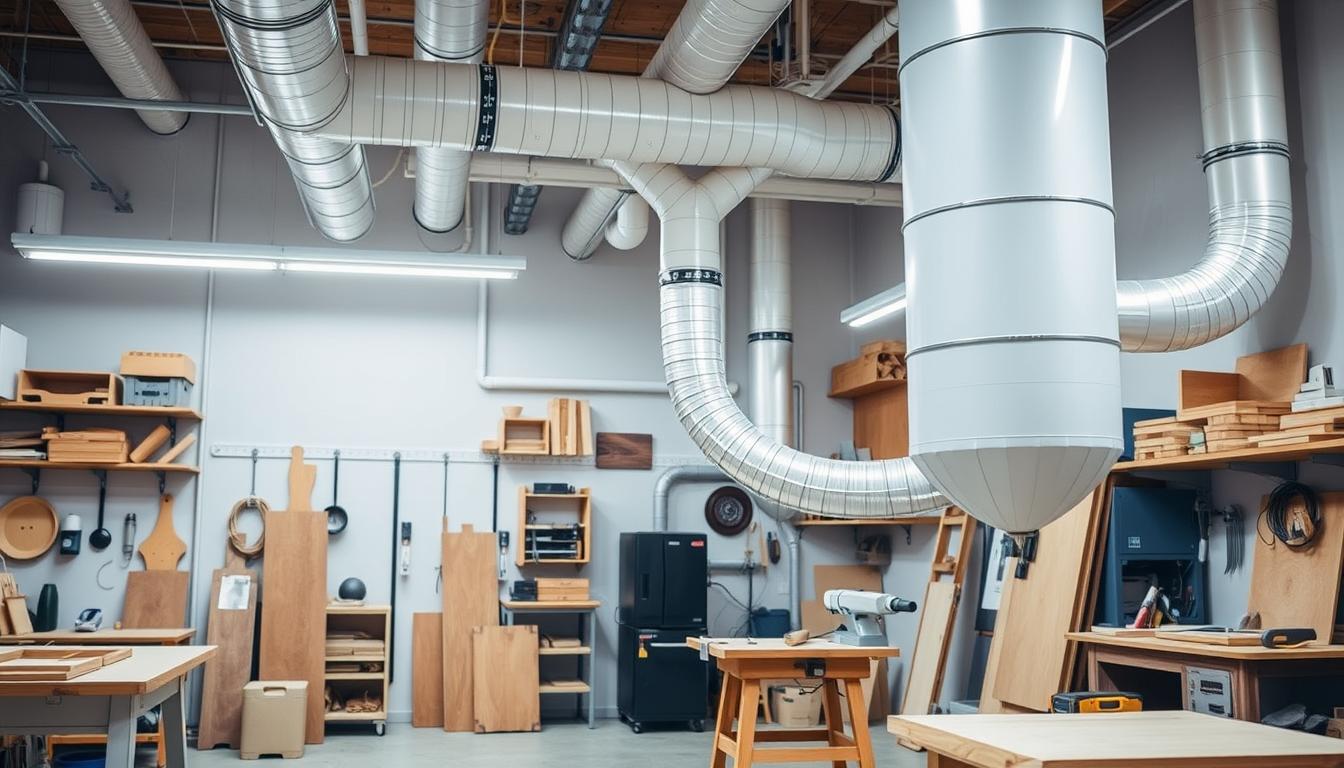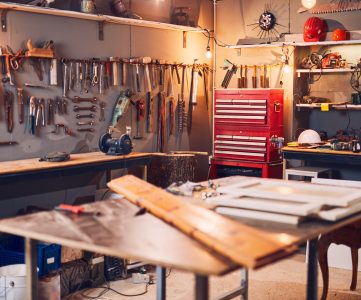A clean and safe workshop is key for woodworking or manufacturing. Dust collection systems are vital for keeping the air clean. They help prevent respiratory problems and protect tools from damage. A good dust collection system makes your workshop healthier and more productive.
Dust collection is important for removing dust and debris from the air. This can cause health issues and damage tools. A well-designed system improves ventilation, reducing dust and debris. This makes the air cleaner and safer for everyone.
Good air filtration is crucial for a healthy work environment. Dust collection systems remove airborne particles. This reduces the risk of respiratory problems and other health issues. By choosing the right system, you can create a cleaner, safer, and more productive workspace.
Introduction to Dust Collection
Key Takeaways
- Dust collection systems are essential for maintaining good workshop ventilation and air filtration.
- Effective dust collection can help reduce the risk of respiratory problems and protect tools from damage.
- A well-designed dust collection system can improve workshop ventilation and air filtration.
- Good air filtration is crucial for maintaining a healthy work environment.
- Choosing the right dust collection system can ensure a cleaner, safer, and more productive workspace.
- Dust collection systems can help remove airborne particles, reducing the risk of health issues.
Understanding the Critical Role of Dust Collection in Your Workshop
A clean workshop is not just productive but also healthier and safer. Dust management is key to keeping your workshop clean. It’s vital for protecting your health and tools. The Occupational Safety and Health Administration (OSHA) warns that wood dust can cause respiratory problems and other health issues.
Regular dust collection helps avoid these risks. It keeps your workshop clean and healthy. This also protects your tools and equipment from damage, saving you money on repairs and replacements.
Health Risks of Wood Dust Exposure
Wood dust can lead to respiratory issues and skin irritation. Long-term exposure can cause asthma and breathing problems. By focusing on dust management, you can reduce these risks and ensure a safer workspace.
Impact of Dust on Tool Performance
Dust can harm your tools and equipment, shortening their life and performance. Regular dust collection prevents this. It keeps your tools working well, saving you money on repairs and replacements.
Workshop Air Quality Standards
Good air quality in your workshop is crucial for safety. A dust management system improves air quality. This makes your workshop healthier and safer for you and your tools.
| Benefits of Dust Management | Importance |
|---|---|
| Health Protection | High |
| Tool Protection | High |
| Improved Air Quality | High |
Types of Dust Collection Systems for Different Workshop Sizes
Keeping your workshop clean and safe is key. Dust collection plays a big role in this. There are many dust collection systems out there. It’s important to pick the right one for your workshop size.
Shop vac systems are great for small workshops. They are portable and work well for dust collection. For bigger workshops, central systems are better. They offer a full workshop ventilation setup.
Think about the tools you use in your workshop. Different tools make different amounts of dust. You need a system that fits your workshop’s needs. Here are some common dust collection systems:
- Portable units: perfect for small workshops or occasional use
- Central systems: great for larger workshops or heavy-duty use
- Cyclone collectors: can boost efficiency when used with other systems
Choosing the right dust collection system makes your workshop better. It’s cleaner, safer, and more efficient. Good dust collection and workshop ventilation protect your health and tools. Consider getting a reliable shop vac system or central system.
Essential Components of an Effective Dust Collection Setup
A good dust collection setup is key for a clean workshop and worker safety. It’s all about effective air filtration to clear dust and particles from the air. You need dust collectors, ductwork, piping, and filters for this.
Choosing the right dust collector is important. They come in different sizes and power levels. You must pick one that fits your workshop and dust type. Also, ductwork and piping need to be the right size and installed well for good dust collection.
Filtration systems are also crucial. They help remove dust and particles from the air. These systems have efficiency ratings from 95% to 99.97%. Picking the right one is key for a clean workshop and worker health and safety.
Dust Collectors and Their Specifications
- Horsepower ratings
- CFM ratings
- Filter type and size
Ductwork and Piping Requirements
- Proper sizing and installation
- Material selection (e.g. metal, PVC)
- Sealing and insulation
- Efficiency ratings (95% to 99.97%)
- Filter type and size
- Replacement and maintenance schedules
Filtration Systems and Efficiency Ratings
Selecting the Right Dust Collection Capacity for Your Needs
To keep your workshop clean and safe, picking the right dust collection capacity is key. The size of your workshop, the tools you use, and how much dust they make all play a part. A dust collection system that’s too small won’t work well. But a system that’s too big is a waste of money.
When thinking about dust collection, workshop ventilation, and air filtration, think about what your workshop needs. For example, if you use power tools that make a lot of dust, you’ll need a system with more capacity. But if you have a small workshop and don’t use many tools, a smaller system might be enough.
Here are some things to think about when choosing the right dust collection capacity:
- Workshop size: Bigger workshops need more powerful dust collection systems.
- Tool usage: Tools that make a lot of dust need systems with higher capacity.
- Dust generation: Workshops that make a lot of dust need better air filtration and workshop ventilation.
By thinking about these factors and picking the right dust collection capacity, you can keep your workshop clean and safe. Don’t forget to also think about dust collection, workshop ventilation, and air filtration when making your choice.
| Workshop Size | Tool Usage | Dust Generation | Recommended Dust Collection Capacity |
|---|---|---|---|
| Small | Low | Low | 100-200 CFM |
| Medium | Medium | Medium | 200-400 CFM |
| Large | High | High | 400-600 CFM |
Professional Installation vs. DIY Setup: Making the Right Choice
Workshop owners face a choice: get a pro to install a dust collection system or do it themselves. A clean workshop is key for health protection. A good dust collection system is vital for this. While DIY might save money, a pro ensures it’s done right and safely.
Here are some key considerations when deciding between professional installation and DIY setup:
- Cost: Professional installation can be more expensive, but it provides peace of mind and ensures that the system is installed correctly.
- Technical expertise: Professional installers have the necessary technical expertise to ensure that the system is installed properly and functions effectively.
- Time investment: DIY setup can be time-consuming, and it may require a significant investment of time and effort to get it right.
A proper dust collection system is essential for maintaining a clean workshop and ensuring health protection. By considering the pros and cons of professional installation versus DIY setup, workshop owners can make an informed decision that meets their needs and budget. Effective dust management is critical for a safe and healthy working environment.
The choice between professional installation and DIY setup depends on the workshop owner’s specific needs and budget. Weighing the costs, technical considerations, and time investment helps make a decision. This ensures effective dust management and a clean workshop that supports health protection.
| Installation Type | Cost | Technical Expertise | Time Investment |
|---|---|---|---|
| Professional Installation | Higher | High | Low |
| DIY Setup | Lower | Low | High |
Maximizing Your Dust Collection System’s Performance
To get the most out of your dust collection system, regular maintenance is key. This means cleaning the filters and checking the ductwork. This ensures the system works well. Also, good workshop ventilation keeps your workspace safe and healthy.
Investing in a top-notch dust collection system helps a lot. Following the right maintenance steps boosts air filtration in your workshop.
Here are some tips to make your dust collection system better:
- Regularly inspect and clean the filters to keep them efficient
- Check the ductwork for any blockages or damage
- Make sure the system is set up right for your workshop
By following these tips and choosing a quality dust collection system, you’ll have a safer and healthier workspace.
Maintenance and Upkeep of Your Dust Management System
Keeping your dust management system in top shape is key. It ensures your workshop stays clean and safe. Regular cleaning helps prevent dust buildup and keeps the system running well.
A clean system is vital for your health and a tidy workshop. Follow the filter replacement schedule to keep the air clean. Also, fix any issues quickly to avoid downtime and keep the system efficient.
- Regularly inspecting and cleaning the system’s components
- Replacing filters according to the manufacturer’s guidelines
- Checking for blockages and leaks in the ductwork
By following these tips, you can keep your dust management system working well. This means a clean workshop and better health protection.
Integrating Mobile Dust Collection Solutions
For small workshops, mobile dust collection solutions are a good choice. Portable shop vac systems can be moved around to collect dust effectively. It’s key to think about ventilation and how these systems make your workshop cleaner and safer.
Portable Units for Small Shops
Portable units are great for small shops or areas without a central system. They are small, light, and easy to move. Adding portable units to your dust collection plan can improve ventilation and lower health risks from dust.
Connecting Multiple Tools
Connecting tools to a mobile dust collection system boosts efficiency and cuts down dust. This is super useful in small spaces where many tools are used together. A mobile system helps manage dust and improves ventilation, making your workshop safer and healthier.
When adding mobile dust collection solutions, consider these points:
- Check your workshop’s size and layout to find the best spot for your system.
- Pick a system that fits your tools and equipment.
- Keep your mobile dust collection system clean and well-maintained for best results.
Upgrading Your Existing System for Better Efficiency
A good dust collection system is key for a clean and safe workshop. Upgrading your system can make it more efficient. This reduces dust buildup and improves air filtration. Think about upgrading the dust collector, adding ductwork, or a better filtration system.
First, check your workshop ventilation needs. Look at your workshop size, tools, and dust levels. This helps you choose the right upgrades. Some ideas include:
- Installing a more powerful dust collector for better dust collection
- Adding more ductwork for better workshop ventilation and less dust
- Upgrading to a more efficient filtration system for cleaner air filtration
Upgrading your system makes your workshop cleaner, safer, and more efficient. It boosts your health, safety, and productivity. Plus, it cuts down on maintenance costs. Always research and compare options to find the best fit for you.
Conclusion: Creating a Cleaner, Safer Workshop Environment
As we wrap up our look at dust collection systems, it’s clear how vital a clean and safe workshop is. A good dust management system protects workers’ health and keeps tools in top shape. It’s key to keep your system running well through regular upkeep, correct setup, and good filters.
Having a clean workshop does more than just keep workers safe. It also boosts productivity, cuts down on downtime, and makes your space a place of pride. With the right dust collection system, you and your team can work in a safer, more efficient environment.



